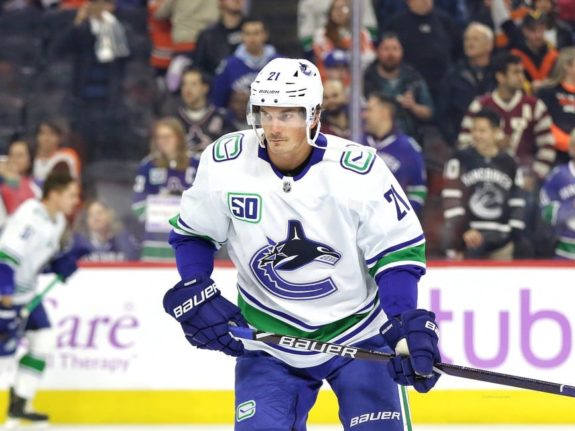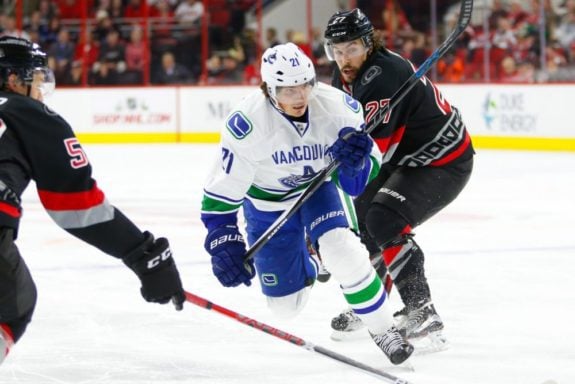
 Landon Kapusianyk
The Hockey Writers
Landon Kapusianyk
The Hockey Writers
31
Reads
0
Comments
Canucks’ Eriksson Showing Signs of Improvement
Apparently, lightning strikes more than once. On Tuesday, Jan. 7, the Tampa Bay Lightning struck nine times in their 9-2 victory over the Vancouver Canucks, including six goals in the second period. Poor Jacob Markstrom could not find shelter quick enough during this surge as his team left him out to dry. Surprisingly, Loui Eriksson was one of the lone bright spots during this game.
Poor History with Canucks
Eriksson has been a lightning rod for criticism ever since his first game with Vancouver. This criticism was well deserved, as he scored against his own team during that game. Eriksson has only scored 35 goals with the Canucks in 220 games, only five more than the amount he scored with the Boston Bruins the year before Vancouver signed him.
During Eriksson’s stint with Vancouver, his value has permanently been damaged and cannot be fully repaired. However, the damages can be mitigated.

The controversial veteran has been playing better as of recently. Highlighted by a goal against the Lightning, Eriksson has put up three points in his last four games.
Before we get ahead of ourselves, it is crucial to recognize that Eriksson’s offensive production will never warrant the $6 million in salary per year that the Canucks will pay him until 2022. Most followers of the Canucks want to erase this painful cap error from their memory and Eriksson seemed destined for burial in the minors at the beginning of this season. To the dismay of all Canucks fans, Sven Baertschi and Nikolay Goldobin were the players sent down with Eriksson remaining with the Canucks. Neither Baertschi nor Goldobin were claimed by another team and Eriksson was a healthy scratch for a handful of games at the beginning of the season.
Chemistry with Horvat and Pearson
Now the 34-year-old Swede is playing around 15 minutes a night in a bottom-nine role while killing penalties. Recently, he has been a decent match on the shutdown second line with Bo Horvat and Tanner Pearson. Certainly, it helps Eriksson to play with two excellent players such as Horvat and Pearson. The line has produced the most expected goals per 60 minutes for a line that has played more than 80 minutes together for the Canucks.
Horvat and Pearson have produced better with Eriksson than without. This line’s Corsi stat, which tracks shots attempted for and against, is a percent higher with Eriksson along with a 15 percent higher goals for percentage. Further, more high danger chances were created, ultimately leading to more expected goals with Eriksson.

The sample size with Eriksson on this line is 11 games, which is small. However, one of those games was the loss against the Lightning where every player was negatively impacted on the stat sheet. Horvat has had a revolving door of wingers for too long, therefore it would be great if this successful short sample size could translate into fixing a long-term problem the Canucks have had.
Eriksson’s Individual Points Percentage (IPP) is only 36.36 percent according to Natural Stat Trick. Essentially what this means is that he is only picking up points on 36 percent of the goals scored while he is on the ice. His average over the last three years with the Canucks is 67.32 percent which suggests there could possibly be more room for offence. At this point with Eriksson, any offensive production is a pleasant surprise.
Options Moving Forward
It makes sense to try and make the best out of a bad situation and get as much value as the Canucks can get, as long as Eriksson is not hurting the team. So far, he is not hurting the team. Therefore, it is logical to play him as a depth defensive forward and take any offensive production as a bonus.
Additionally, the Canucks do not have any great alternatives. Buying-out Eriksson is tricky as his contract includes $28 million in signing bonuses which must be paid in full and not spread out over numerous years.

If the Canucks were to buy him out in June, his buyout would still cost the Canucks a $5.6 million cap hit next year. Year two of the buyout would cost the Canucks $3.6 million in cap hit during a crucial offseason where both Elias Pettersson and Quinn Hughes need new deals. The final two years of his buyout would be a cap hit of $666,666 – a fitting number to end his Canucks career.
Management could look into restructuring his contract after the bonuses are paid but it is unlikely Eriksson will cooperate. Retirement is also on the table as Eriksson will be 35 in July.
Trading Eriksson would require taking back another terrible contract, retaining salary or giving away valuable assets such as prospects and draft picks. Unless he experiences more success playing on Horvat’s line which changes teams’ perspective on Eriksson and makes a trade more likely to occur.
Eriksson expressed some agitation with his role to a Swedish reporter earlier this summer, but since the season started Eriksson has been all business. Vancouver has one of the youngest rosters in the league composed of many Swedes and it is likely that Eriksson has been sharing some valuable wisdom to those younger players.
Canuck supporters have come to accept that Eriksson is not an all-star point producer worth the amount he is being paid. However, he is proving that he still holds some value at the NHL level. Somebody needs to do the dirty work for the Canucks.
Those defensive responsibilities can lead to a massive liability if a younger player is slotted in that role and cannot defend properly. The Canucks are pushing for a playoff spot for the first time in several years and do not have the leeway they did in prior years to experiment with younger players to help grow their defensive game while additionally trying to win valuable games.

In the meantime, the Canucks’ AHL affiliate is providing some of those young players, like Kole Lind, with a surplus of ice time that is vastly aiding their development. As for Baertschi and Goldobin, it seems that the Canucks’ management does not see them fitting in, considering the duration of their last few call ups.
For the first time in three and a half seasons, Eriksson has given the Canucks something positive to talk about. We can only hope that he continues his recent play for as long as possible, so the next two years are not as dreadful as the first few.
The post Canucks’ Eriksson Showing Signs of Improvement appeared first on The Hockey Writers.
Popular Articles

















































 Blackhawks Chicago
Blackhawks Chicago Panthers Florida
Panthers Florida Penguins Pittsburgh
Penguins Pittsburgh Rangers New York
Rangers New York Avalanche Colorado
Avalanche Colorado Kings Los Angeles
Kings Los Angeles Maple Leafs Toronto
Maple Leafs Toronto Bruins Boston
Bruins Boston Capitals Washington
Capitals Washington Flames Calgary
Flames Calgary Oilers Edmonton
Oilers Edmonton Golden Knights Vegas
Golden Knights Vegas Flyers Philadelphia
Flyers Philadelphia Senators Ottawa
Senators Ottawa Lightning Tampa Bay
Lightning Tampa Bay Red Wings Detroit
Red Wings Detroit Islanders New York
Islanders New York Sabres Buffalo
Sabres Buffalo Devils New Jersey
Devils New Jersey Hurricanes Carolina
Hurricanes Carolina Stars Dallas
Stars Dallas Jets Winnipeg
Jets Winnipeg Blue Jackets Columbus
Blue Jackets Columbus Predators Nashville
Predators Nashville Wild Minnesota
Wild Minnesota Blues St. Louis
Blues St. Louis Mammoth Utah
Mammoth Utah Ducks Anaheim
Ducks Anaheim Sharks San Jose
Sharks San Jose Canucks Vancouver
Canucks Vancouver






